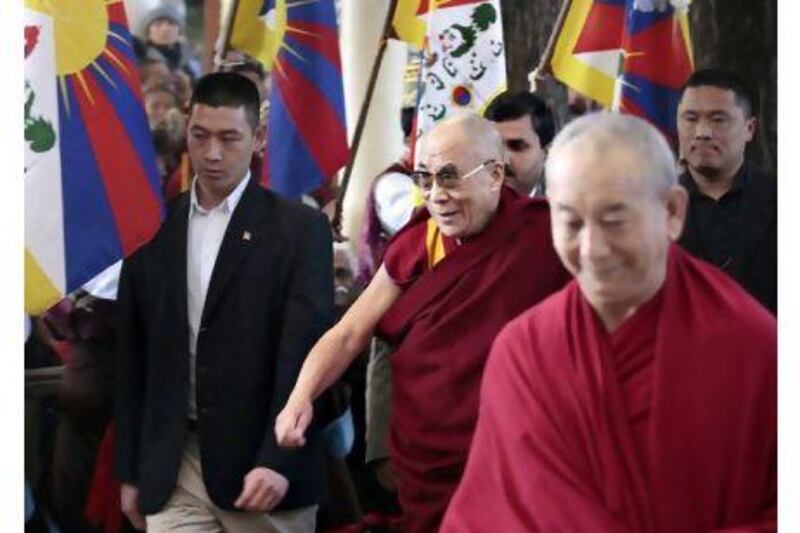NEW DELHI // After half a century of leadership from their Dalai Lama, or "Great Ocean of Wisdom", the Tibetan community-in-exile now finds itself adrift in political uncertainty.
In a week's time, Tibetans around the world will vote for one of three prime ministerial candidates, each offering a new voice and vision for the direction of the Free Tibet movement. Although the Dalai Lama, 76, will retain his spiritual position as the head of Tibetan Buddhism, he will give up his political role, and his peaceful "Middle Way" strategy - demanding autonomy within the greater Chinese state - will be up for debate.
"I have repeatedly stressed that Tibetans need a leader, elected freely by the Tibetan people, to whom I can devolve power. Now, we have clearly reached the time to put this into effect," the Dalai Lama said last week, on the 52nd anniversary of the 1959 uprising in Lhasa against Chinese rule. The events of 1959 forced the religious leader into a dramatic escape across the Himalayas to India, where he has been based ever since.
The Dalai Lama's decision to relinquish political power will be the first order of business when the 14th Tibetan Parliament-in-Exile sits tomorrow for its final session in India's northern city of Dharamshala.
The parliament will first vote on whether the Dalai Lama's decision can even be debated, and then discuss the amendment to the Tibetan charter that would be required to relieve him of his political role.
Since 2001, the Tibetan community-in-exile has elected a Kalon Tripa - a prime minister who leads the cabinet - while the Dalai Lama has still been the head of state. It is this role - and not his central religious role in Tibetan Buddhism - that he now wishes to give up.
To Tibet-watchers, the Dalai Lama's statement came as no surprise. As Tibet expert Claude Arpi noted, the Dalai Lama had for years been preparing the ground for his eventual departure from the forefront of the campaign for an autonomous Tibet.
In late 2008, he called a public meeting in Dharamshala to discuss the future of the Tibetan cause and his own role as political leader. A month after that meeting, he announced that he was moving into "semi-retirement" and that all political decisions would be taken by the Kalon Tripa.
Despite all the forewarning, the transition will be difficult due to the sheer length of time that the Dalai Lama has been the political and spiritual leader of Tibetans in exile.
Splitting that twinned role will be a challenge. "Even if he walks away from the political leadership, nobody can take away his status as a religious leader," said Geshe Lhakdor, the director of the Library of Tibetan Works and Archives in Dharamshala and for many years the Dalai Lama's official translator.
Youdun Aukatsang, a member of the Tibetan parliament, said he believed that the Dalai Lama was being transparent about his motivations to step down. "I don't think it has to do with age or unhappiness," said Ms Aukatsang. "In my opinion, he thinks that in the eyes of the modern world, the Tibetan community would benefit from a democratically elected leader. He genuinely wants a leader elected by the people."
Even so, Ms Aukatsang pointed out that, democratically speaking, "it would still be the people's will that he continue."
Mr Arpi said he posed this scenario to the Dalai Lama in 2006. By his account, Mr Arpi told him: "You speak about democracy, but if a poll is undertaken today, nobody will vote for your retirement." The Dalai Lama, Mr Arpi recalled, explained his decision by saying that if he died while holding political leadership, chaos would ensue.
Mr Arpi saw the timing of the Dalai Lama's announcement as significant, coming as it does days before the March 20 elections for a new parliament and a new Kalon Tripa. "It wouldn't have been fair for him to say that he was still involved even as you have an election for a new prime minister," he said.
The absence of the Dalai Lama will leave in doubt the fate of his favoured Middle Way, by which he has peacefully lobbied for an autonomous Tibet. In 2008, he admitted that his approach had not worked. A measure of dissatisfaction with the Middle Way strategy has also seeped into the Tibetan youth.
Chenga Tsering, a career adviser for Tibetan youngsters in New Delhi, said some of his wards - including members of the Tibetan Youth Congress - support a demand for complete independence.
Mr Arpi has also noted frustration with the Middle Way, which he said "has not led anywhere for many Tibetans. I don't think the youngsters would now be ready to carry a Chinese passport and be Chinese citizens."
At least one of the three prime ministerial candidates, Mr Arpi said, was in favour of a far tougher stand - and the Dalai Lama's decision to step down would give the next leader space to explore an alternative approach. "Now it's all opening up," Mr Arpi said. "If he was still around, the prime minister would have to follow the Middle Way, too. Now, though, the Dalai Lama has left it up to the Tibetan people to decide."





